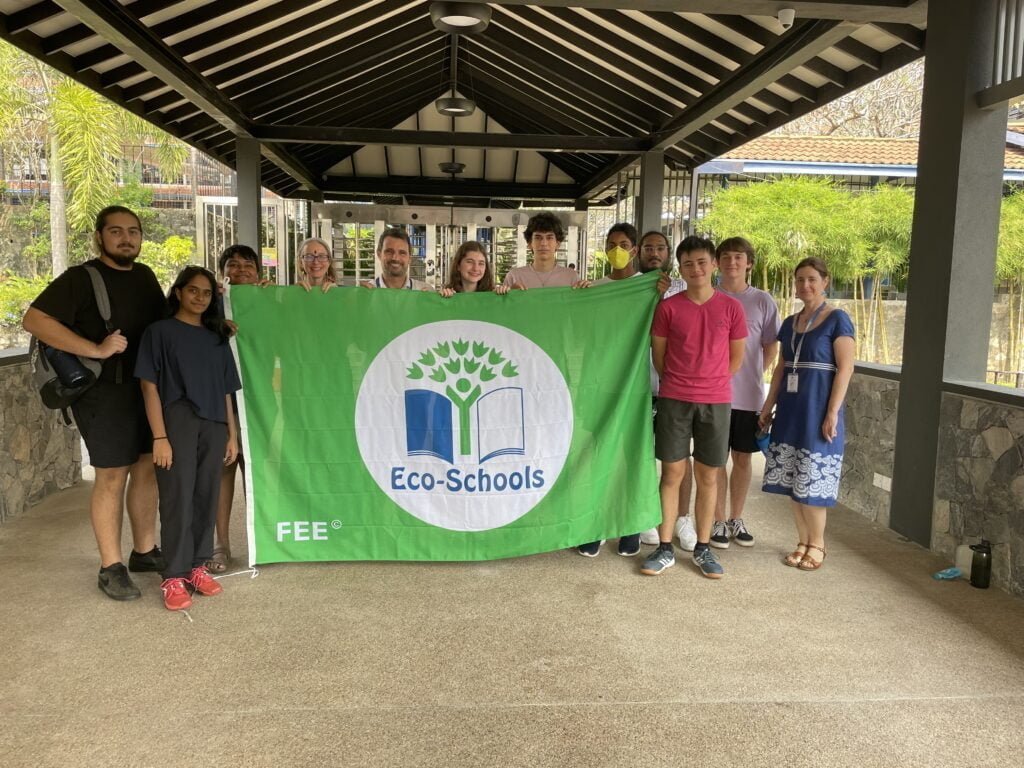The Overseas School of Colombo is a benchmark institution of academic finesse, specialising in holistic experiential learning. Situated in the Western Province, OSC is the oldest international education institution established in 1957, and the only IB World School in Sri Lanka. A pristine campus that has stayed true to its motto ‘Unity in Diversity’ in the aeons of its existence.

The Overseas School of Colombo has attained yet another milestone by receiving the prestigious Eco-Schools Green Flag Award, awarded by The Federation of Environmental Education (FEE), to schools having made measurable progress in environmental sustainability. This is the first time a school in Sri Lanka has obtained the Eco-Schools Green Flag Award for being a sustainable eco-conscious facility fulfilling all the required standards.
Sri Lanka, with lavish biodiversity, is home to endangered fauna and flora that face considerable environmental challenges. The country suffers from ecological impediments; poor solid waste management, traffic air pollution, significant habitat loss, viral infections like Dengue spread by mosquitoes due to manifold contaminated areas around the city, and the burning of plastic to name a few dilemmas that affect the country’s biodiversity.
The Overseas School of Colombo decided to address the aforesaid environmental threats and find solutions for the broader ecological problems. This was achieved by advocating the Eco-Schools programme, the largest global sustainable school’s initiative, implemented in 74 countries, in 59,000 schools, with over 19,000,000 students partaking in this worldwide initiative.
OSC’s Eco-School journey commenced in November 2020. It began with a group of passionate minds including students, teachers, parents, and other representatives of the OSC community. The debut meeting drew the interest of 65 attendees. Soon after, students rendezvoused weekly at early morning sessions before school. This became the basis of the Eco-Schools Committee, now comprised of students, many who are leaders of school service groups that include Recycling and Sustainability, Housing and Habitat, Sustainable Gardens, Eco-Club and the Primary Service Ambassadors, along with teachers, parents, operations staff and the wider OSC community.
OSC made it the focal point to assiduously build an environmentally conscious future, that is inclusive as it is sustainable, working towards achieving net zero emissions, enhancing biodiversity, reducing pollution and waste, and implementing actionable initiatives to tackle climate change. And thus, OSC followed the Seven Steps Framework designed by Eco-Schools to partake in the global programme, completing the Steps aligned with the criteria to receive the Eco-Schools Green Flag Award.
Never leaving a stone unturned, OSC ventured to carry out a School Wide Audit employing qualitative and quantitative research to gather data on the these key areas: Energy at campus and homes, Waste at home and the campus, Transport, Biodiversity, Nature at Campus and at home and Food at home and at campus. The findings were then used to conceive the central Three Themes.
The Overseas School of Colombo selected Three Themes that would be the school’s focus: Biodiversity, Climate Change, Pollution & Waste. Biodiversity – OSC examined the flora and fauna present in the school environment, focusing on ways to increase levels of biodiversity around the school. To improve biodiversity, students proposed building several gardens around the school. They picked the best locations for the gardens and their functionality (the gardens needed to be close to the actual gardeners e.g.: 6th grade – primary – kindergarten students). Deliberate factors like sunlight and rain, tree coverage, shade and proximity to the cafeteria and compost were also considered.
The students implemented the project after consulting with OSC’s Architect, Landscape Designer and Operations Manager. The four gardens include the Courtyard Garden, Primary Garden, Mystery Garden and Kindergarten Garden. Each garden has its own features and purpose. For instance, the kindergarten garden consists of three low raised-garden beds and a compost pile in an area close to the cafeteria. Similarly, the Primary Garden, with five garden beds still being constructed, includes one for each grade level and offers easy access to classrooms in what students call Zone 1.
Students plant flowers and aromatic spices in the Mystery Garden to attract more pollinators to help improve biodiversity. The raised-garden beds are used for students to plant and grow vegetables and herbs in order to reduce the need to procure these from outside, cutting down on transportation, thereby helping decrease carbon emissions. The gardens project is a great example of students working together. Students designed the gardens, built them, some planted and maintained the gardens, while others fertilised the gardens with nutritious fertiliser (from the biogas plant) and compost.
Students also carried out a campus wide Biodiversity Scavenger Hunt to identify rare endemic creatures on campus. Pollution & Waste – OSC examined the impact of waste on the environment and explored actions to minimise the amount of waste that the community at large produces and disposes of on a daily basis.
Waste Management initiatives were carried out by establishing a Biogas Plant, Compost System & Worm Plant, Recycling & Sustainability Service.
The OSC Biogas Plant is an initiative where the food waste from the cafeteria (amounting 2kg – 5kg per day) is utilised in the plant and converted to biogas. The students test the potency and quality of the biogas by cooking popcorn and making hot chocolate for everyone to enjoy! In addition, students collect metal, glass, cardboard and paper from every classroom in the school which they store in the local recycling center that buys the material from the students. Climate Change – OSC observed the impacts the faculty and its surroundings have on the Climate through certain lifestyles, habits and behaviour, and assessed how certain actions could influence the situation in a positive way. Students carried out ‘street sweeps’ around the school and in local wetland areas to remove plastic from the environment. The OSC students also encouraged neighbours to avoid burning plastics in the area. OSC formulated a truly unique Eco-Code linked to its mascot the Gecko: G – Green, E – Ecologically, C – Considerate, K – Kind to, O – Our and S – Surroundings.
Eloise Neil D. Golding, Chairperson of the OSC Eco-Committee said: “It’s important to us to cherish what we have left of nature and to take care of it to the best of our abilities. Being an eco-school helps to push us towards those goals, keeping us motivated to stay on track. Getting this award has set us apart from others and has created a stronger feeling of community. “
Eco-Schools Green Flag Award is the greatest honour that could be bestowed upon a school for achieving momentous, praiseworthy sustainable change. In a time where so many speak about the myriad environmental challenges we face, yet rarely take measured steps to ‘talk the talk and walk the walk’ – The Overseas School of Colombo has proven that it is a pedigree of its own (like its mascot the Gecko!), an education institution with a penchant to strive towards unity, to maintain diversity, and remain steadfast to its promise to protect and preserve the environment.






